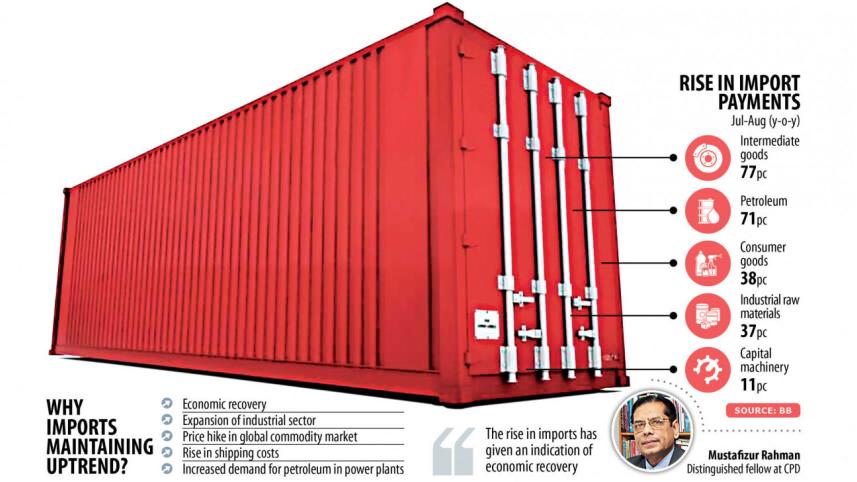Import bills surpass pre-pandemic levels

Import payments surged in Bangladesh in the first two months of the current fiscal year to go past the pre-pandemic levels, a sign of strong economic recovery in keeping with a sharp fall in coronavirus infections.
The settlement of letters of credit (LCs), also known as actual import payments, swelled 45.3 per cent year-on-year to $10.76 billion between July and August, according to data from the Bangladesh Bank.
The payments went past the pre-pandemic level: the country spent $8.97 billion in the first two months of the fiscal year of 2019-20.
Along with the recovery, the commodity price and the shipping cost have increased to a large extent, pushing up the import payments, analysts say.
Mustafizur Rahman, a distinguished fellow of the Centre for Policy Dialogue, said the rise in imports indicated that the economic recovery was on the right track.
Businesses imported capital machinery worth $639 million in the first two months of FY22, an increase of 11 per cent from a year ago.
"The rise in the imports of capital machinery is a good sign. It showed that businesses are expanding," Rahman said.
"But, we have to take into account the price effect in the global market. The cost of imported commodities is on the rise."
The shipping cost has gone through the roof, rising four-five times the pre-crisis level, as demand rose globally. As a result, inflationary pressure has built up, and it might intensify in the days ahead.
"This will bring a negative effect for the common people if their income level does not go up," said Rahman.
The price hike of petroleum products may play a major role in raising inflation.
The import cost of petroleum products stood at $1.04 billion in July-August, up 71 per cent year-on-year.
ABM Azad, chairman of Bangladesh Petroleum Corporation, said the latest upward trend of petroleum prices in the global market had not created any major impact for the country yet.
The demand for petroleum from furnace oil-based power plants has increased all of a sudden, sending the import of the item to an elevated level, he said.
A central banker said that the import cost of the item would widen in the coming months as the price was on the rise in the global market.
On October 8, the price of benchmark Brent crude oil stood at $81.2 per barrel in contrast to $42.8 a year ago.
Emranul Huq, managing director of Dhaka Bank, said both price and the volume of imported items had increased in recent months as the economy was running in full swing.
In some cases, the cost of capital machinery has increased by 40-50 per cent compared to the pre-pandemic level. "Still, the private sector is expanding their operations. This is a good sign for the economy," he said.
The price of industrial raw materials such as scrap metal and cotton went up significantly in the global market.
Between July and August, businesses imported raw materials worth $3.9 billion, up 37 per cent from a year ago.
Because of the higher import payments, the volume of the foreign exchange reserves might decrease to some extent in the coming months if export earnings and remittance flow don't go up proportionately.
The central bank has started injecting US dollars into the market to cool off the foreign exchange regime.
After purchasing a record $7.93 billion of US dollars last fiscal year, the Bangladesh Bank sold $946 million between August and September as many banks are facing a shortage of greenback amid rising imports, moderate exports and slowing remittance flow.
Syed Mahbubur Rahman, managing director of Mutual Trust Bank, said a majority of countries had contained the pandemic, helping their economies rebound.
"Bangladesh has also contained the pandemic. So, the rise in imports will continue."
BB data showed the opening of LCs rose 48.6 per cent to $12.13 billion in July and August, meaning import payments would increase further.




 For all latest news, follow The Daily Star's Google News channel.
For all latest news, follow The Daily Star's Google News channel.
Comments